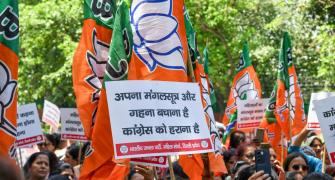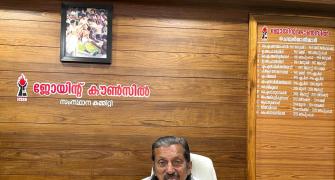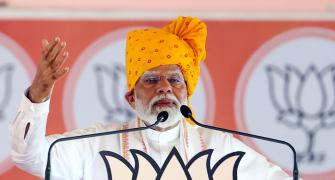Getting the requisite numbers to pass the Civil Liability for Nuclear Damage Bill 2010 in the Lok Sabha may be the least of the United Progressive Alliance's problems. Lawyers and legal experts, including those who support the legislation, say there are many instances of poor drafting and anomalies that have the potential to generate more controversy if the Bill is passed in its current form.
"There is no denying that we need this Bill but it urgently needs drafting changes," said former Minister for Law and Justice Ram Jethmalani at a recent seminar.
"The text of the statute has left a number of loopholes that can be exploited skillfully to dodge paying compensation to the victims and may end up in a legal minefield," added Nilendra Kumar, director, Amity Law School and former Judge Advocate General of the army (September 2001 to November 2008).
The issue of who is entitled to make a claim is a case in point. Clause 14 of the Bill lists four categories of people: (a) the person who has sustained injury; or (b) the owner of the property to which damage has been caused; or (c) the legal representative of the deceased; or (d) any agent duly authorised by such person or owner of legal representatives.
Clause 31(2), however, expects the "person suffering such damage" to make the application. "Legally, this leaves room for ambiguity," Kumar said.
He also raised the issue of what would happen if an entire family were, say, wiped out by a nuclear incident. "Who will make the claim in this case?" he asked.
Then again, Clauses 16 (5) and 33(10) of the Bill say the claims decided by a claims commissioner or a commission would be final, provisions that effectively remove the scope for appeal. Given that the magnitude of damage from a nuclear incident is potentially huge, lawyers have questioned whether the adjudication of a right affecting the life or property of individuals can be allowed to be made final in this way.
The issue of who is liable for a nuclear incident is another point of contention. Section 4(1) stipulates that "the operator of the nuclear installation shall be liable for nuclear damage caused by a nuclear incident." Samit Aich, executive director of Greenpeace India, said this provision conforms to the concept of "legal channelling" under which the operator is the only party that victims can hold responsible for a nuclear accident. This, however, effectively provides immunity to the supplier, designer and so on. Such a provision would, for instance, let foreign suppliers of such vital equipment as reactors, like Westinghouse of the US or Areva of France, off the hook in the case of a nuclear incident. On the other hand, countries that follow systems of "economic channelling" enable victims to initiate lawsuits against any of the parties involved.
Kumar makes the additional point that the Bill covers civil liability for nuclear damage in power generation, but not in the case of victims of damage caused by ships or submarines armed with and propelled by nuclear power. "It is now in the public domain that India is developing a nuclear submarine. Except in the case of war or training exercises, nuclear submarines, which may have machinery of foreign origin, are usually parked near coastal fleets, close to human habitation," he said, adding, "The fact that the Bill does not cover such incidents points to discrimination."
Lawyers have also criticised section 5 of the Bill, which states that the operator will not be liable for any nuclear damage caused by factors such as "an act of armed conflict, hostility, civil war, insurrection or terrorism". This, lawyers say, provides operators with a handy escape clause.
Meanwhile, section 6 offers scope for the most controversy. Most commentators, activists and political parties have pointed to the fact that the operator's liability at Rs 500 crore is too low and reduces the incentives for the nuclear industry to maximise safety standards. "There is no logic or sound basis to this amount if you consider that the compensation for Bhopal was about the same amount," said Kumar, adding, "The cost of inflation over the past two decades has rendered the value of Rs 500 crore as peanuts."
Legal experts also point to the fact that sub-section (2) of Clause 6 is mutually contradictory since it allows the government to increase or decrease this amount. This is considered particularly contentious when the operator and regulator are both on the same side.
Kumar also suggested it would be more accurate if the term "risk involved" for the government to determine compensation were replaced with "damage involved".
Moreover, the entitlement to the compensation does not include any interest costs or costs of proceeding, leaving victims at the mercy of the operator.
Activists such as Greenpeace, which oppose nuclear energy in favour of renewable sources such as solar and wind, have pointed out that the Rs 500-crore operator liability compares poorly with companies like Germany, Japan and Switzerland, which have unlimited liability.
In the US, too, the $10-billion pooled fund liability is increasingly being considered inadequate. Bharatiya Janata Party's Murli Manohar Joshi said the Price-Anderson Act, under which this compensation has been mandated, has been dubbed "half-Price Anderson" against growing demands that the compensation be doubled. This in a country, he added, that hadn't built a nuclear power station for the past 14 years.
Further, the financial memorandum sets out the liability in terms of "per nuclear incident". Given that one "incident" tends to trigger chain reactions (which is what happened in the case of both Three Mile Island and Chernobyl), this phrase provides scope for unscrupulous operators to claim several incidents as one incident.
Finally, the government has also made it necessary for the operator to get its liability covered by insurance (Clause 8). This is considered another escape route because it provides operators the opportunity to deny paying compensation on grounds of differences with its insurer.
| RINGSIDE VIEW | ||
| Issue | Provision | Anomaly |
| Who can claim compensation |
Clause 14 of the Bill lists four categories of people |
Clause 31(2) "person suffering such damage" . Scope for ambiguity |
| Award by Claims Commissioner |
Clauses 16 (5) and 33(10) say claim will be final |
No appeal or review mechanism provided |
| Who is liable | Clause 4(1) says operator will be liable |
What about liability of suppliers of equipment? |
| Provides for civil liability for nuclear power generation |
What about ships or submarines armed with and propelled by nuclear power | |
| Exemptions | Section 5 excludes operator in case of armed conflict, insurrection, terrorism etc |
Provides operators with an escape clause |
| Limits of liability | Section 6(2) allows govt to increase or decrease liability |
Can be contentious because govt is both operator and regulator |
| Entitlement does not include any nterest costs or costs of proceeding |
||
| Operator insurance | Clause 8 makes it necessary for the operator to get insurance |
Provides operators with opportunity to evade payment citing differences with insurance company |
Government officials deny that the Bill provides loopholes for operators of nuclear power plant -- which are confined to the public sector under current law. "If you look at Clause 7, you will see there is absolutely no question of the government running away from its responsibilities," said Congress spokesman Manish Tiwari.
Stressing that the legislation was necessary now that India had signed the Indo-US civil nuclear deal, a government official said the Bill ensured "no-questions-asked" compensation, after which victims also had recourse to the legal system. There were no plans, the official added, to re-draft the Bill ahead of its introduction in the Lok Sabha but it would receive due scrutiny by a parliamentary standing committee. Lawyers, however, are sceptical because standing committee recommendations are not binding and have often been disregarded in the past.
Who will guard the guards?
The Atomic Energy Act, 1962, does not allow private parties to enter nuclear power generation. Only government-owned entities like the Nuclear Power Corporation of India (NPCIL) or, say, NTPC can do so. Who will regulate these entities? By convention, it should be an independent regulator. The problem is the regulator is not independent in India. Here's why.
The administration of the Atomic Energy Act comes under the Department of Atomic Energy (DAE). But, the Atomic Energy Regulatory Board (AERB), which was set up in 1983, derives its regulatory authority from the Atomic Energy Act and the Environmental Protection Act, 1986, unlike, say, the telecom, insurance or market regulator which were constituted under separate Acts. AERB, in turn, is answerable to the Atomic Energy Commission, whose ex-officio chairman is also the secretary of DAE. So, a government that hopes to conform to international law with this Bill ignores one of its key conventions.








